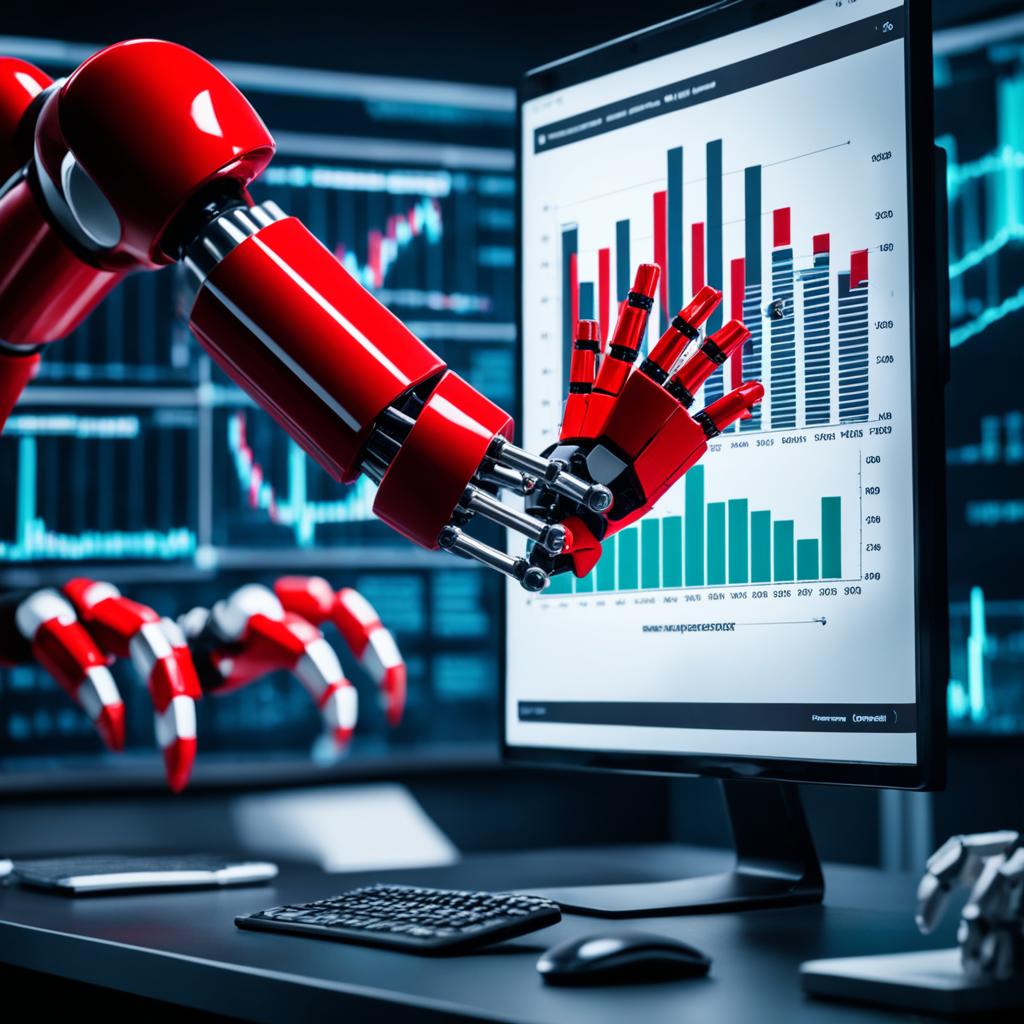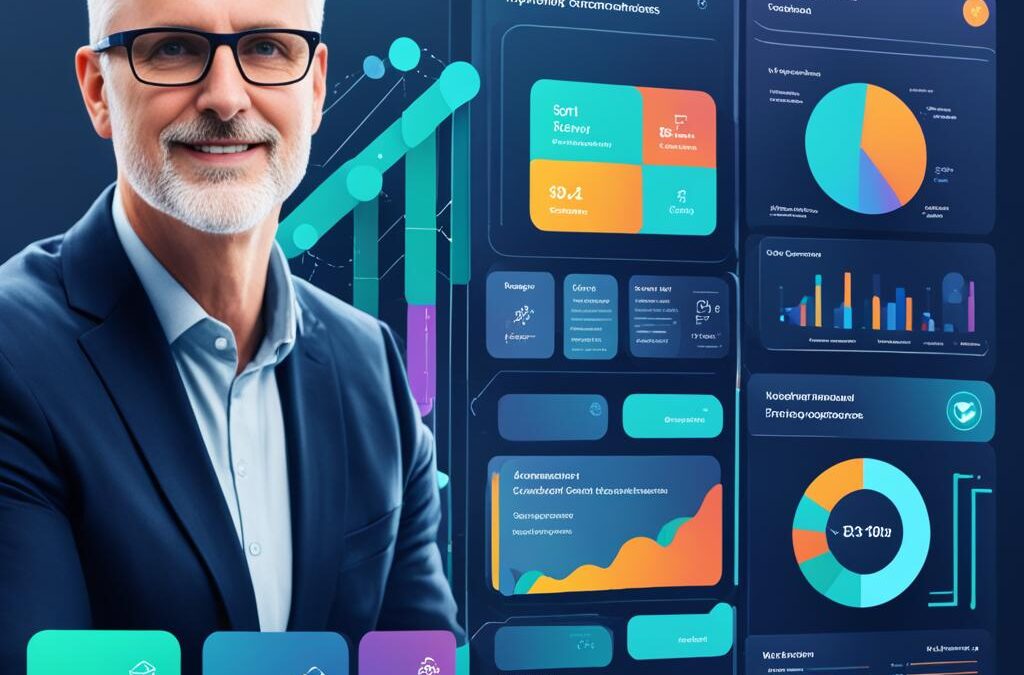The Artificial intelligence (AI) has undergone dynamic development and is no longer used exclusively in the business-to-consumer (B2C) sector. Particularly in the world of Business-to-Business applications (B2B apps), it opens up innovative ways of working with AI-based technology Business processes automate and Intelligent functions to integrate. This is what it is all about, AI not just as a tool, but as a central building block in the foundation of The company in order to promote sustainable growth and efficiency.
AI integration in B2B apps ranges from optimizing internal processes to improving customer service. It can support decision-making, provide data-driven solutions and thus become an indispensable futuristic tool. For The company of any size that operate in the B2B sector, the Implementation from AI technology therefore a clear added value and Competitive advantage.
Important findings
- AI as a transformation driver in B2B applications, increases effectiveness and Automation of business processes.
- Process automation through AI offers The company significant time and cost savings.
- Intelligent functions, applied in B2B apps, are redesigning customer service and the product experience.
- AI technology makes companies more agile and prepares them for the challenges of the digitalized business world.
- AI integration forms the basis for data-driven decision-making processes and optimized operating procedures.
The importance of AI for the B2B world
The landscape of the business world is constantly changing, and Artificial intelligence (AI) is playing an increasingly important role. In the B2B sector in particular, the use of AI applications a wide range of options for optimizing processes and generating competitive advantages. More and more B2B companies recognize the potential that the AI technology has in store for them.
AI as a key technology for B2B companies
AI systems offer far more than just a Process automation: They make it possible to make analytical decisions based on complex data, which is particularly important for B2B software solutions represents considerable added value. Precise algorithms make it possible to find more efficient ways of Product development and identify and serve customer needs more precisely. In this way, the Artificial intelligence in the business world an indispensable component for continuous innovation and growth.
Learning from B2C: recognizing the potential of AI in B2B
Despite the widespread assumption that AI is primarily a B2C domain, the Artificial intelligence increasingly also in B2B companies practical application. In that these companies AI technologies which were originally developed for the B2C sector, new opportunities for customization and personalization are emerging in the B2B segment. This results in improved customer relationships and increased sales efficiency.
Continuing B2B companies are therefore endeavoring to expand the range of AI in the B2B world to their full potential. From big data analysis and supply chain optimization to personalized customer service solutions through AI applications - the Artificial intelligence in the business world opens up new horizons for B2B companies' business models.
AI integration in product development
Advancing digitalization offers enormous opportunities for the Product development in various industries. Artificial intelligence (AI) is opening up new dimensions - from smarter data processing to the development of more effective business strategies. In this context, the following play a key role AI-supported tools play a key role in speeding up processes and significantly increasing efficiency throughout value chain management.
Increased efficiency through AI-supported tools
Advanced AI-based applications can be used to solve complex challenges in the Product development efficiently. These tools enable targeted analysis and Automation of development steps that previously had to be carried out manually. AI in B2B apps systematically reduces sources of error and accelerates development cycles so that companies can react more quickly to market developments.
Example Siemens: AI support in medical technology
A striking example of the successful use of AI in product development is the area of Medical technology. Siemens is a pioneer in the use of AI-integrated technologies, as demonstrated by the latest developments in computer tomography (CT) scanners. The AI algorithms implemented there support medical professionals with patient-specific instructions to optimize the quality of diagnostic images. This ultimately helps to significantly improve clinical decision-making and take patient care to a new level.
AI technologies in the service sector
In the modern Service sector take AI technologies play a central role. They not only help companies to optimize their services, but also enable a new level of customer interaction and satisfaction. The focus here is particularly on the intelligent software solutions from Autodesk and the CRM platform Salesforce Einstein.
AI applications at Autodesk and Salesforce
Autodesk, known for its innovative design software solutions, uses machine learning to simplify complex design processes. With this technology Autodesk its users a generative design technology which helps to implement efficient and optimized designs. Salesforce Einstein on the other hand, relies on the power of AI to CRM systems and take sales processes and customer management to a new level.
Optimized CRM systems through intelligent data analysis
Intelligent data analysis plays a decisive role in the interaction between AI and CRM. Salesforce Einstein for example, uses machine learning and predictive analytics to improve customer-centric services and refine marketing strategies. These advanced systems not only improve customer loyalty through personalized experiences, but also expand the capabilities of the sales team through more efficient data processing and interpretation.
AI in B2B apps
In today's business world, efficiency and agility are key elements for success. Artificial intelligence (AI) is proving to be a trailblazing force in this regard, which, through AI integration in Business-to-Business applications enables transformative change. AI-based apps in the B2B sphere seemed like a distant possibility for a long time, but today they are a reality and a key driver of progress.
With the help of the AI integration can Business processes not only automated, but also implemented intelligent features that offer companies real data-driven solutions. These Integration allows business processes to be redesigned and operational performance to be optimized. AI tools and applications are therefore no longer just aids, but fundamental components of a modern company.
Artificial intelligence in B2B apps not only emphasizes the Automation to the next level. It also serves as an analysis tool that helps companies to identify patterns and make strategic decisions based on these findings. AI is therefore an indispensable ally in the increasingly data-intensive business world.
The AI-based app-The development team relies on advanced technologies to not only simplify processes, but to make them smarter - so that companies are able to act proactively and not just react.
The following table provides an overview of how AI can be used for various Business processes in B2B companies:
| Business process | Without AI | With AI |
|---|---|---|
| Data analysis | Time-consuming and error-prone | Fast and precise |
| Customer service | Standardized and impersonal | Individual and customer-oriented |
| Marketing & Sales | Generic and broadly diversified | Targeted and personalized |
| Product development | Lengthy and costly | Efficient and cost-effective |
The introduction of AI in B2B apps requires a well thought-out strategy and a willingness to embrace a new way of doing business. AI opens the door to a new era of efficiency and allows companies to see today's challenges as opportunities for tomorrow's growth. It is becoming increasingly important for B2B companies to embrace AI and understand it as an integral part of their business model.
Process automation to increase efficiency
In the age of digitalization, business processes play a decisive role in a company's success. The Integration Artificial intelligence (AI) makes an essential contribution here, not only to optimize processes in the Production to automate, but also to achieve significant growth in other business areas. Cost reduction and Increased efficiency to make this possible. AI in companies stands for intelligent networking and optimization of processes, which is essential for future competitive success.
Examples of efficient business processes through AI
Artificial intelligence makes it possible to make processes faster, more cost-effective and more adaptive. For example, the use of AI in logistics can optimize inventory management, resulting in lower warehousing costs and improved delivery capability. The intelligent Process automation also makes it possible to automate routine tasks and free up employees for more complex tasks.
Cost reduction and time savings in production
The Process automation in the Production The potential of AI ranges from predictive maintenance to fully automated production control. With the help of AI, downtimes can be minimized and production processes can be made more efficient, which not only leads to a Cost reductionbut also to a significant Time saving leads. This aspect is particularly relevant in production areas where high demands are placed on precision and speed.
Below you will find a detailed overview of how AI influences process automation and efficiency in various business areas:
| Business division | Process without AI | Process with AI | Impact on efficiency and costs |
|---|---|---|---|
| Customer management | Individual support | Automated service bots | Increased efficiency and Cost reduction in customer service |
| Warehousing | Manual inventory check | Automatic inventory management | Time savings and avoidance of excess stock |
| Production planning | Static production plans | Dynamic, data-driven planning | Less downtime and faster adaptation to the market |
| Quality control | Visual checks by employees | Automated quality assurance | Reduced waste and increased product quality |
The process automation achieved through AI therefore not only represents a Competitive advantage but is a decisive step towards an innovative corporate culture. Organizations that integrate AI into their Business processes can be more adaptable and responsive, which ultimately leads to growth and success.
Revolutionizing marketing through AI
The Marketing revolution has begun, and AI technology is at the heart of this change. Innovative AI applicationsunderpinned by the power of machine learning, are transforming traditional marketing into an age of Hyperpersonalization and highly efficient Lead generation. Digital intelligence is thus becoming an irreplaceable driver for AI in marketing.

Hyperpersonalization in marketing strategies
A personalized customer approach is the be-all and end-all for surviving in the digitalized world of B2B marketing. This includes content that is precisely tailored to the individual needs of the target group. Through the use of AI in marketing allows the interests and behavioral patterns of customers to be precisely analyzed, which leads to tailored customer communication and strengthens loyalty.
Lead generation and qualification with AI
In order to increase efficiency in sales and improve the quality of Lead generation to improve the quality of life, more and more intelligent AI solutions for use. AI-controlled chatbots act as the first point of contact, which are not only available around the clock, 365 days a year, but also have the potential to identify and qualify high-quality leads. These AI applications are continuously learning and optimizing themselves to ensure an increasingly accurate approach and promote sales success in the long term.
Human resources and the integration of AI
The advanced possibilities of the AI integration railroads in the Human resources new paths and set the course for the future. From the Automation in recruiting up to the targeted Employee development - Artificial intelligence contributes significantly to Increased efficiency and to the qualitative improvement of human work processes.
Automation of recruiting processes
The Recruiting is one of the first stages in the employee lifecycle and benefits fundamentally from the introduction of automated AI systems. By using intelligent software to pre-screen candidates, including scanning CVs and assessing suitability, recruiters can offload time-consuming tasks and focus on interacting with qualified candidates.
Strategic employee development through AI analysis
With the AI analysis of employee data opens up new possibilities for personalized and needs-oriented support for each individual. Findings from AI analyses help to design individual development paths that are tailored to the skills and career goals of employees and thus support the strategic development of the company. Employee development.
| Range | Conventional method | AI-supported method | Advantages of AI integration |
|---|---|---|---|
| Recruiting | Manual sighting | Automated analysis of application documents | Saving time and improving the quality of applicants |
| Employee feedback | Regular surveys | Ongoing sentiment analysis | Recognizing moods and the need for action in good time |
| Further training | Standardized training courses | Individual learning paths based on AI | Increase learning efficiency and employee satisfaction |
Revolutionizing financial management with AI
The ambitions of modern finance are increasingly focused on the efficient use of data and the security of processes in order to meet the high standards of the industry. Artificial intelligence (AI) is playing a central role in this development by replacing the traditional Financial management fundamentally transformed. Companies that AI in B2B apps benefit from a comprehensive overhaul and automation of their financial processes, resulting in increased operational efficiency and a substantial competitive advantage.
Fraud detection and prevention with the help of AI
With the arrival of AI in the Accounting complex patterns and anomalies that could indicate fraudulent activity can be identified. By continuously analyzing transactions and detecting irregularities, AI systems are able to take preventive measures to prevent fraud. Fraud detection and reduce potential financial losses for companies. The revolutionary ability of AI to learn from historical data and further use these insights to prevent fraud scenarios is invaluable for the security of financial management.

Automation in accounting and controlling
Automation and AIIntegration ranges from the digitization and processing of documents to the creation of financial reports and advanced predictive analytics models. Through the use of AI in controlling enables companies to ensure faster and more accurate financial reporting while saving valuable resources by reducing manual activities. This leads to improved cost efficiency and easier decision making as finance managers are equipped with meaningful forecasts and real-time analysis.
| Process | Traditional method | AI-supported method | Advantages of AI integration |
|---|---|---|---|
| Fraud detection | Manual check | Automated pattern recognition | High precision, real-time detection |
| Financial reporting | Time-consuming creation | Fast, data-driven reports | Significant time savings |
| Budget planning | Static prediction models | Dynamic forecasts with AI | Improved basis for decision-making |
| Accounting | Manual input prone to errors | Precise AI automation | Error reduction, Increased efficiency |
A precise look into the future reveals that AI has the potential to change the Financial management to completely revolutionize the way companies work and take them to a new level of efficiency and security.
Robot-based process automation (RPA) in B2B apps
The advancing digitalization has brought with it the robot-assisted automation (RPA) a new level of Increased efficiency achieved. Especially in B2B apps offers RPA promising options for automating repetitive and time-consuming tasks and freeing up employees for strategic tasks.
Sequence of automated processes and their advantages
The Automation of processes through RPA in B2B environments follows a simple pattern: software robots simulate the activities of a human at a computer and carry out predefined tasks independently. The advantages range from a reduction in human error and time savings to cost reductions, which make it possible to B2B companies to deploy their resources more effectively and focus on core competencies.
Use cases of RPA in the B2B sector
RPA can be used in various sectors within the B2B area. These include automated invoice processing, the aggregation and analysis of large volumes of data for reporting and support in customer management through automated communication processes.
In all of these Use cases are achieved through the use of RPA Automated processes The RPA technologies are designed to increase efficiency and simultaneously improve the quality of work results. Small and medium-sized companies, which often do not have a great deal of IT expertise, can gain valuable competitive advantages with the help of RPA technologies, as the underlying processes can be optimized. automated processes can be implemented quickly and scaled easily.
| Process | Traditional design | RPA-supported execution | Improvements through RPA |
|---|---|---|---|
| Data management | Manual data entry and maintenance | Automated data acquisition and updating | Reduction of errors and time expenditure |
| Customer support | Personalized support | Automated response systems | Round-the-clock availability and faster response times |
| Invoice processing | Manual creation and booking | Automated processes from receipt to payment | Increasing process efficiency and Cost reduction |
Decisive steps for implementing AI in B2B apps
The Implementation of artificial intelligence (AI) in B2B apps brings with it numerous challenges. In order to master these successfully, a structured approach is required that includes in-depth analyses and careful Selection and integration.
Analysis of the current situation and definition of AI goals
First, a comprehensive analysis of the current state of the existing systems and processes must be carried out. This serves to understand the current level of performance and the potential improvements through the introduction of artificial intelligence. The development of clear AI goals, aligned with the company's business strategy and growth plans, is the basis for a goal-oriented implementation. Implementation. Not only the optimization of existing processes, but also the creation of new business opportunities are at the heart of AI objectives.
Selection and integration of suitable AI solutions
Once the objectives have been defined, the Selection the right AI solutions. When selecting the optimal B2B software It is not only technical compatibility that is crucial, but also the user-friendliness and scalability of the tools. The integration of AI software should be seamless and enable users to use AI functions effectively in their day-to-day business. The aim is to find applications that support the company in B2B apps and simplify collaboration both internally and with business partners.
Finally, it is of the utmost importance to develop the right implementation strategy to ensure a smooth introduction of AI. Training, pilot projects and continuous optimization of the AI technology used ensure sustainable success in the digital transformation of the company. AI in B2B apps is not a one-off project, but an ongoing journey of innovation and improvement.
Conclusion
The implementation of artificial intelligence (AI) in day-to-day business has established itself as groundbreaking for B2B companies. The ability to develop through innovative AI technologies standing out from the crowd is more than ever a decisive factor in global market competition. It is no longer just about automating routine tasks, but also about in-depth analyses, efficient resource management and driving digital transformation - in short, about the strategic added value that AI provides companies in the B2B sector.
Strategic added value of AI for B2B companies
By B2B companies AI technologies By using artificial intelligence in a targeted manner, they not only achieve cost savings and optimize their business processes, but also generate important insights into customer behaviour and market developments. This data-driven approach enables precise forecasts and personalized customer solutions that would be unthinkable without the use of artificial intelligence. The strategic added value created by AI is consequently reflected in the form of increased productivity and improved decision-making quality.
Paving the way for the future: AI as a competitive advantage
AI is not just a technological gimmick, but a central pillar in the The future of the business world. Companies that invest in AI technologies at an early stage and make them an integral part of their operations position themselves as pioneers in their industries. This far-sightedness gives them sustainable competitive advantages and builds bridges to a smart networked economy in which AI-supported solutions set the tone. AI is thus becoming an indispensable ally on the road to tomorrow's digital age.
FAQ
What is AI in B2B apps?
AI in B2B apps refers to the use of artificial intelligence technology in business-to-business applications. The aim is to optimize business processes through Intelligent functions and process automation.
Why is AI particularly important for B2B companies?
AI enables B2B companies to develop innovative products and services, improve business processes and make them more efficient. This not only leads to cost reductions, but also to a Competitive advantage in the market.
How does AI support product development in B2B companies?
AI supports product development with advanced analysis tools that make it possible to design products faster and in a more customer-oriented way. Examples include AI-supported CT scanners from Siemensthat improve medical diagnostics and decision-making.
To what extent do service companies benefit from AI technologies?
Service companies benefit from AI by optimizing their service offerings. Intelligent software such as Autodesk, for example, enables complex design tasks to be managed more efficiently and CRM systems like Salesforce Einstein use AI for personalized marketing and sales.
How can AI be integrated into B2B companies?
The integration of AI in B2B companies first requires a precise analysis of the current situation and clear target definitions. The appropriate AI solution is then selected and integrated into the existing systems and processes.
What advantages does process automation through AI offer?
Process automation using AI can greatly improve the efficiency and accuracy of business processes, reduce costs and save time. Especially in the Production AI can create great added value through predictive maintenance.
How is AI changing marketing strategies in the B2B sector?
AI is revolutionizing B2B marketing through the possibilities of Hyperpersonalizationthe improvement of Lead generation and qualification as well as more efficient customer relationship management. AI-based chatbots and analyses optimize customer interaction and promote sales success.
How is AI influencing human resources?
In the Human resources AI enables the automation of Recruiting-processes, provides valuable insights by analyzing employee feedback and thus supports strategic personnel decisions, e.g. in the development and promotion of talent.
What role does AI play in the financial management of B2B companies?
AI plays a central role in the Financial managementby increasing the efficiency of processes, helping to detect and prevent fraud and speeding up analyses. This leads to improved performance in all financial processes.
How is RPA used in B2B applications?
RPA, or robotic process automation, is used in B2B applications to automate repetitive and time-consuming tasks. This increases efficiency and allows employees to focus on more complex tasks.
What are the key steps to implementing AI in B2B apps?
Important steps for implementing AI in B2B apps are the comprehensive analysis of the existing system, the definition of specific AI goals and the Selection the right AI solution that can be seamlessly integrated into the company.
What strategic added value does AI offer B2B companies?
AI offers enormous strategic added value by helping companies to optimize their processes, increase efficiency and productivity, develop innovative solutions and ultimately secure sustainable competitive advantages and become more future-proof.


Recent Comments